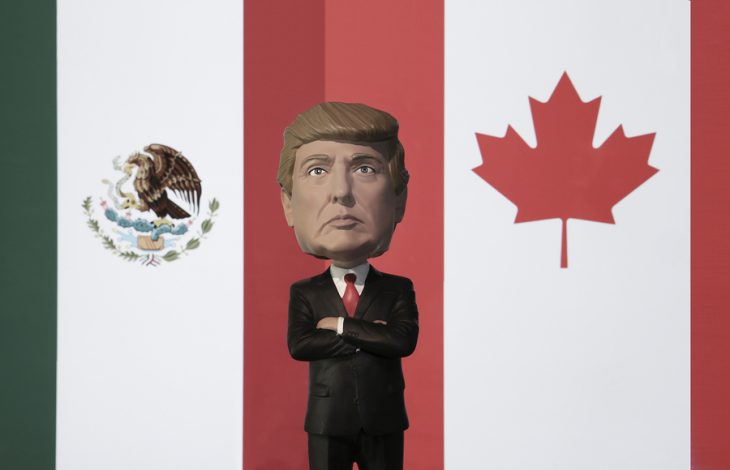
U.S. cable comes to the defence
WASHINGTON – Every now and then the spectre of Canadian TV distributors having to pay retransmission fees for their carriage of American off-air TV channels rears its head. Now, thanks to the renegotiation of the North American Free Trade Agreement, it’s rising to the fore once again.
Heading into the negotiations, the National Association of Broadcasters (the American broadcasters’ very effective lobby group) made it clear to U.S. trade representatives that they want this new line of revenue from carriers to the north and the south, along with two other key demands.
“While technologies and the competitive landscape have evolved, there are several legislative, policy and regulatory impediments that continue to inhibit the ability of U.S. broadcasters to capitalize on the opportunities afforded in Canada and Mexico. It would be appropriate to address those impediments in the renegotiation,” reads the NAB letter sent in June to Edward Gresser, chairman of the U.S. trade policy staff committee.
“Those impediments include:
1. The inability of U.S. broadcasters to consent, or to withhold consent, to the distribution of their signals by Canada’s broadcasting distribution undertakings (BDUs) and to obtain economic benefit for the retransmission of their broadcast signals in Canada;
2. The discriminatory tax treatment of advertising by Canadian entities on U.S. broadcasters, including for content distributed in Canada; and,
3. Remaining equity restrictions on foreign investment in broadcasting in Canada and Mexico.”
So, the NAB wants border broadcasters to be able extract fees from Canadian cable, satellite and IPTV companies for the carriage of the likes of local ABC, CBS, NBC and FOX affiliates. In the U.S., carriers there pay by some estimates, US$20 billion per year for the rights to carry those broadcasters – often after bitter battles where signals have been removed from local cablecos, for example. “This situation represents an unfair barrier to trade and should be remedied during the renegotiation of NAFTA,” continues the letter.
“This situation represents an unfair barrier to trade and should be remedied during the renegotiation of NAFTA,” – National Association of Broadcasters
The NAB also doesn’t like that Canadian advertisers get to claim a tax credit for advertising on Canadian TV stations and not American ones, and it wants its members to be able to move into the Canadian market if they want.
Now, we’ve asked and have been promised an answer from our federal government about what it thinks about this and what its positions have been on this in the four rounds of negotiations which have happened so far (or if it’s even come up). The most we’ve heard anyone say is that the federal government is firm on maintaining the cultural exemption which now exists in the existing NAFTA deal – which generally allows Canada to set its rules on culture such as television however it likes.
However, with a U.S. president who lies a matter of course and has the temperament of a toddler, it’s impossible to know which direction these talks may head and which bargaining chip may get used to save, say, the automotive industry or the Canadian dairy industry’s supply management system during negotiations, to cite two examples.
Thankfully, there is actually a formidable defender south of the border: The American cable industry. A number of its members, including the American Cable Association, the NTCA – Rural Broadband Association, and huge MSO Charter Communications sent their own letter to Gresser, asking him not to bargain on retrans.
“Over the past decade, the retransmission consent regime enacted in the United States has driven up the price consumers pay for cable service and been the source of hundreds of service interruptions impacting millions of American television viewers without any countervailing improvement in broadcast programming,” reads the cable letter.
“It is thus highly unlikely that any revenues that U.S. broadcasters obtain from Canadian MVPDs will benefit the American public. On the other hand, it is far more certain that requiring Canadian MVPDs to pay US broadcasters will directly lead to the imposition of a reciprocal retransmission consent requirement on those American MVPDs that have historically distributed Canadian broadcast stations to American audiences, driving up prices for American consumers and increasing the number of service disruptions that they face.”
We forget this here, but many Canadian border TV stations are offered by carriers (BDUs here are called MVPDs, or multichannel video programming distributors, there) in the U.S. for free.
Adds the cable letter: “The result will be one of three outcomes: (1) further increases in the cost of MVPD service for American consumers as MVPDs pass through the new fees; (2) the removal from channel lineups of Canadian stations that have long been a part of the viewing experience in American communities located near the US-Canada border; or (3) the removal of other channels from channel lineups to offset the new retransmission consent costs. None of these results benefit United States consumers, and they must be weighed against the ephemeral nature of the benefits claimed by the Broadcasting Industry Stakeholders.”
Besides, it notes, there is already a copyright regime in place which compensates, if lightly, those approximately 35 border stations carried in Canada – something Rogers Communications noted in an appearance last month before the Standing Committee on International Trade, as Cartt.ca reported.
However, in that same committee meeting, Bell Canada’s representative argued in favour of a system of fees for carriage of broadcast signals – be they Canadian or American.
After more than 60 years of delivering U.S. OTA stations to Canadians far and wide, would BDUs now have to pay a fee? Can we envision those stations being pulled from Canadian BDU lineups in carriage disputes when they balk at the rates?
Such a possibility has always been dismissed out of hand by most in the industry, given our laws, regulations and protections – but with an intemperate fool like Donald Trump in charge, who’s to say what can rightly be envisioned anymore?



